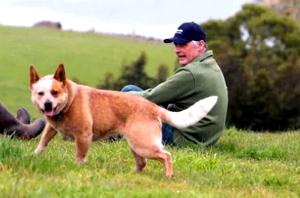
|
|
A new report warns Australians can expect higher food prices and
more shortages as temperatures increase. (ABC News: Pamela Medlen)
|
|
Key Points
|
The environment group Farmers for Climate Action, which commissioned the report, has warned global warming will lead to higher food prices and shortages for consumers.
"Australia's food supply chain is more fragile than people think," report author Stephen Bartos said.
"We have seen examples in recent months of supermarkets running out of food, empty shelves.
"And that's something that, as climate change continues, is going to become an altogether more frequent occurrence."
The report warns drought is becoming more frequent and production is affected by lower crop yields, livestock stress, and higher operational costs.
It also found retailers would be hit by shorter shelf life, less reliability in the availability in some types of food, and lower nutritional value for products such as wheat and rice.
Australia's climate has risen by slightly more than 1 degree Celsius since 1910 and the report said it must be kept to below 2 degrees to prevent catastrophic consequences.
Climate change, war pushing prices higher

|
|
Russia's invasion of Ukraine is also expected to lead to higher
food prices, with both countries major agricultural
producers. (AP: Vitaly Timkiv) |
"One of the drivers is the fact that finance products, like bank loans and insurance, are becoming much more expensive for all of the players because of the uncertainty created by climate change," he said.
"There are higher costs at various different stages of the food supply chain in terms of dealing with the impacts of climate change, and that all gets passed on to consumers."
The report also warned that, as well as climate change, risks to food supply could arise from other causes unconnected to global warming.
The Food Organisation of the United Nations' Food Price Index reported global food prices were up as much as 20 per cent on the year before.
There are also fears Russia's invasion of Ukraine will send wheat and barley prices soaring.
Climate making job harder, farmer says
Beef farmer Fergus O'Connor, from Victoria's South Gippsland region, said climate change was already making life more difficult for farmers.
 South Gippsland beef farmer Fergus O'Connor is concerned about the
effects of climate change and wants action to reduce emissions.
(Supplied: Fergus O'Connor) South Gippsland beef farmer Fergus O'Connor is concerned about the
effects of climate change and wants action to reduce emissions.
(Supplied: Fergus O'Connor)
|
"We're always planning ahead. We're not planning ahead three weeks; we might be planning ahead three or four years."
He said climatic conditions had made that tougher and there was only one way to stop the problem from getting worse.
"It's quite simple. We have to cut emissions from fossil fuels," Mr O'Connor said.He said Australia was "20 years behind Europe" and shifting to renewables would lead to lower power prices.
"We can all go down that path for a better, cleaner atmosphere, which will then in turn help farmers, because then they will be able to plan and things won't be in such extremes of hot and cold and wet and dry," Mr O'Connor said.
Links
- Fork in the road: impacts of climate change on our food supply
- Climate change drives up food prices
- Here’s How Much Food Contributes to Climate Change
- How Much Does Our Food Contribute To Global Warming? New Research Reveals All
- Food production generates more than a third of manmade greenhouse gas emissions – a new framework tells us how much comes from crops, countries and regions
- Global food supplies will suffer as temperatures rise – climate crisis report
- How food waste is huge contributor to climate change

No comments :
Post a Comment